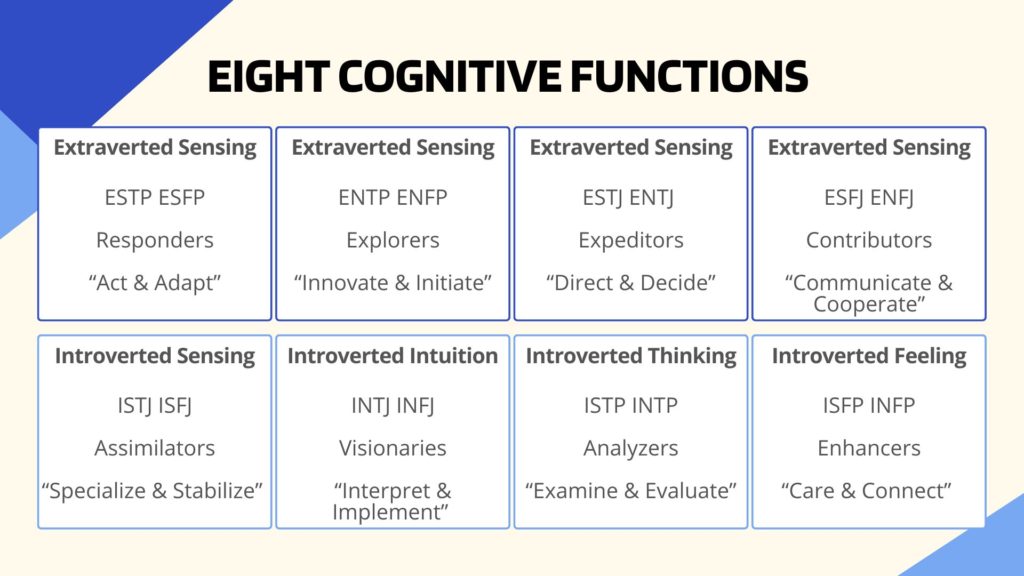The 16 MBTI types can be simplified into 8 Cognitive Functions
Important to remember:
- Everyone uses all 8 functions
- Our type determines our ability to use each function
- 2 will serve as our strengths
- 2 will serve as our weakness or blind spots
- The remaining 4 are our “Shadow Functions”, in our unconscious. Often displayed during stress
- All functions are equally valuable
The Eight Cognitive Functions
- Extraverted Sensing (SE)
- Introverted Sensing (SI)
- Extraverted Intuition (NE)
- Introverted Intuition (NI)
- Extraverted Thinking (TE)
- Introverted Thinking (TI)
- Extraverted Feeling (FE)
- Introverted Feeling (FI)
The Dominant Function
4 of the Cognitive Functions are based on “Perception”, how we take in information (S or N) The other 4 are based on “Judging”, how we make decisions (T or F)
Everyone has one favorite function among the four mental functions (S, N, T or F). Everyone uses that favorite function in their favorite (Extraverted or Introverted) world. This is what determines our Dominant Function.
- Also referred to as our Hero/ Heroine Role
- It is our default function when called to “Save the Day”
- Our natural strength
- How we are “Hard-Wired”
- Our strongest function, usually well developed by age 13
- Often the only function developed at this age.
The Auxiliary Function
We each also have an Auxiliary Function. This is our 2nd strongest function. It is also referred to as our Supportive Parent Role because we use it in a positive, helpful, and supportive way.
It is also usually the one we start with when lending help and support to others.
90% of our personality is made of these two functions: our Dominant & Auxiliary

MICHELE BURCH REID, MS FOUNDER OF LCI
More From Michele
What’s the best personality type match for my romantic relationship?
With Valentine’s day approaching, I thought it would be timely to revisit Personality Types as they relate to relationships. The most common question I have received in all the years doing workshops and coaching on Personality Type and Emotional Intelligence in the...
Using Personality Type To Set Your New Year’s Resolution
If you are like most people, you have the best intentions to set a resolution for the New Year. However, sticking to it is a struggle. Or for some, even deciding what to resolve in the first place is a struggle. Here are some suggested focus areas for setting new...
Introverted Feeling (FI)
Introverted Feeling (FI) ISFJ - INFJ The function is making decisions based on your personal values and being concerned more with how things impact you personally than how the group is impacted. Uses personal, deeply held values to ensure an inner sense of...






